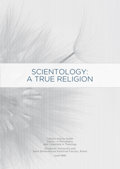The theological tradition does not give us many resources when we wish to analyze the objective characteristics which define a religion and differentiate it from other types of beliefs, ideologies or social groups.
For that purpose we need to use concepts and modern bases which allow us to provide a scientific viewpoint about the religious phenomenon, but without forgetting that this is an individual and intimate experience of spirituality and as such evades some of the commonly used arguments of other social sciences.
This approach of tolerance and interreligious dialogue constitutes a challenge and an absolute necessity in our current society, as is stressed by renowned theologians such as Leonard Boff and Hans Kung.
Just as the word religion is defined (from the Latin re-ligare: unite or reunite) as a community of persons united by a faith, a practice or form of worship, so may religion itself be considered. Of course, this community must be united by a search for “the divine,” and defined by its manner of confronting the problems of human life. That is why in the history of religions much is said of the experience and personal contact with “the sacred.”
An elevated concept of the dignity of the individual, the knowledge and recognition of something called “sacred” are not exclusively Christian but are the essence of all religions. This was recognized by Vatican Counsel II itself in its document Dignitatis Humanae concerning religious faith and purity.
There are other religious phenomena, such as Buddhism and Jainism, which, although lacking an idea of God in terms of reference, do practice a form of respect and reverence of the “sacred divinity,” as a generic element with characteristics much more general than the Christian, Muslim or Judaic “particular gods.”
Maintaining a unitary concept of religion based solely on one’s own experience and excluding other particularities, cannot be other than a form of fundamentalism which violates the most elemental test of religious freedom.
Religion is, then, an absolute necessity, nothing less than a constituent of human existence, which the individual feels in order to “communicate with the infinite”; it is the source of what sustains the human being and on which man depends in many of its aspects.
As Max Muller affirmed, “he who knows only one religion knows none,” which would express the idea with complete precision. Durkheim himself explains the key to this phenomenon: “… religion is a universal phenomenon which appears in all known human societies. …”
It is routine to use known models to attempt to define the unknown. This is a procedure used to excess by social investigators in many cases. Abusing comparative analysis will lead without a doubt to blindness when faced with standards of behavior, beliefs or experiences, which cannot be explained except by omitting any other factor and their similitudes.
Religion is evidently the search, inherent in man, which the spirit makes in order to apprehend the “infinite”; the longing and endeavor of the being with regard to his sense of unfulfilled desire for infinity. Religion is, then, an absolute necessity, nothing less than a constituent of human existence, which the individual feels in order to “communicate with the infinite”; it is the source of what sustains the human being and on which man depends in many of its aspects. The definite proof of this is anthropological analysis in which distinct religious creeds or the lack of them are a determining factor for scholars in understanding social and individual standards of the behavior of societies.
To understand a religion like Scientology it is necessary to evaluate very diverse aspects, such as those indicated by modern experts on this subject (see Bryan Wilson: The Social Dimension of Sectarianism, 1990, and Eileen Barker: New Religious Movements: A Perspective to Understand Society, 1990). Among the many possible approaches, I have selected what could be an objective and scientific view of the matter based on the aspects which I will enumerate here:
1. The philosophical and doctrinal aspect. In this I include the complete body of beliefs, scriptures and doctrines which hold the three fundamental parts of religious knowledge: the Supreme Being, Man and Life.
2. The ritual aspect. This includes the totality of ceremonies, rites and religious practices applied to the religious phenomenon experienced by the Scientologists.
3. The ecumenical organizational aspect. This is an aspect of great importance, because it serves to define the dividing line between religions and beliefs in formation, with those which are already completely formed and evolved.
4. The aspect of the purpose or final objective. Here is the definition of a purpose of life and the final attainment of the spiritual objective which leads to the goal Scientology offers to its parishioners.




























